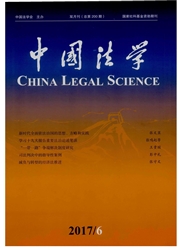

 中文摘要:
中文摘要:
现有的财产罪占有概念几乎都是一种混合的概念,事实性和规范性是它的两端。事实性占有概念要求事实判断是占有的首要判断和基础判断,受物的性质、形态等实质影响,支配并不总是显性可见的。规范性判断在揭示隐性的支配事实和假象性支配时,对占有判断具有选择性的补充作用,这使事实性占有概念趋于缓和化。事实性占有概念中的规范性内涵已扩展到社会学层面和刑事政策层面。规范性占有概念在借助规范性要素扩张占有范围的同时,掏空了占有的实体,造成了占有的过度观念化问题,也造成了对实际的占有问题进行解释时事实性和规范性的冲突,这大大削弱了它的解释力和生命力。
 英文摘要:
英文摘要:
The existing concept of possession in property offenses has almost been a mixed concept with the factual possession and the normative possession as its two extremes. In fact, the concept of factual possession requires that factual judgment shall be primary and basic, which means without domination the possession could not exist, but its nomination is not always visible under the influence of substance's nature, form, etc. In revealing the invisible domination and illusive domination, the normative judgment has a selectively supplementary effect on the judgment on possession, which makes the factual possession more eclectic. The normative contents of the factual possession have expanded to the fields of sociology and penal policies. Normative elements have expanded the normative possession and emptied the entity of the possession, leading to the subjective problem of the possession and generating a conflict between the factuality and normativity in explaining the factual possession. Therefore, the explanatory power and vitality of the normative possession have been greatly weakened.
 同期刊论文项目
同期刊论文项目
 同项目期刊论文
同项目期刊论文
 期刊信息
期刊信息
